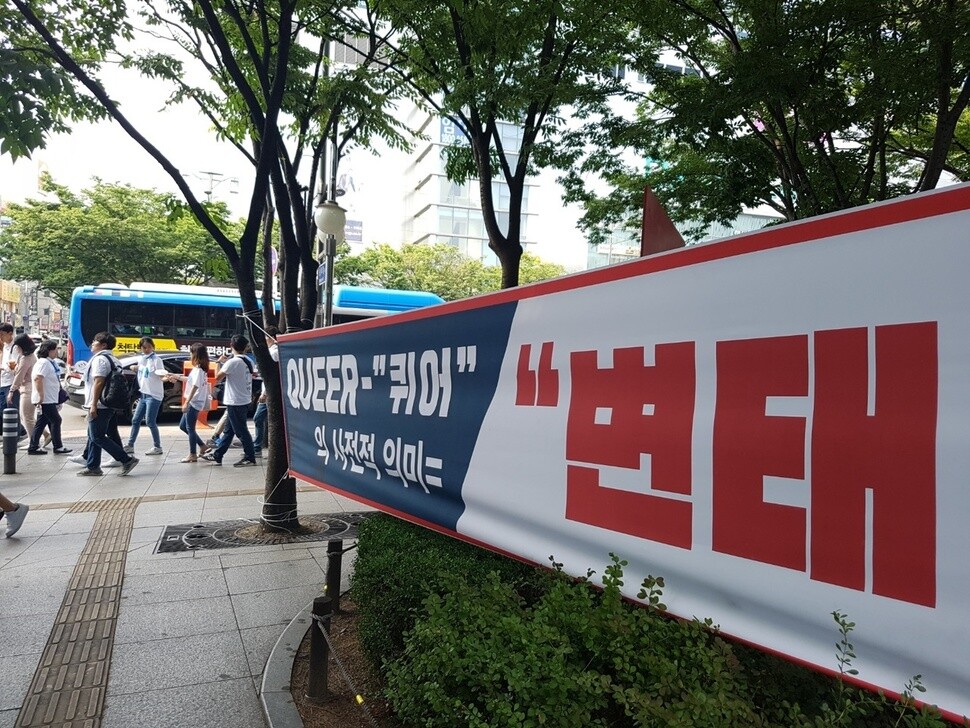hankyoreh
Links to other country sites 다른 나라 사이트 링크
Conservative Protestantism elevates national anti-queer, anti-NK, anti-Islam campaigns

A total of nine “united prayer rallies to stop Islam” have been held to date in the South Gyeongsang Province area. A small pamphlet produced by Christians to spread the word about the rallies includes information on practitioners of Islam in South Gyeongsang’s major cities and a “prayer for the eradication of Islam.” The churches that have orchestrated the prayer rallies in South Gyeongsang are often the same churches attended by the Christians who boarded “Real Love Buses” on June 23 to travel to Daegu and demonstrate against the Queer Culture Festival there.
Conservative Protestants in South Korea have been uniting recently in their opposition to the LGBT community and refugees.
A group launched last year under the name National Alliance to Oppose Homosexuality and the Amendment of the Constitution for Same-Sex Marriage has been operating at a national level, organizing people to hold protests at every national LGBT festival. Early on, the anti-LGBT movement in South Korea consisted mostly of signature campaigns by large churches to oppose legal measures recognizing homosexuality. Recently, however, more and more Christians have been forming outside groups to take more direct action.
“If you look at the groups that are vehemently opposing Queer Culture Festivals and human rights ordinances – like the student parent alliances and soldiers’ groups – they carry the labels of ordinary civic groups,” said Rev. Woo Sam-yeol, chairman of the group South Chungcheong Joint Action to Preserve the Human Rights Ordinance.
“But most of them share ties with conservative Protestant forces in terms of their content and connections,” he explained.
“Conservative Protestantism is coming out of the church, not in the name of religion but under the name of ‘civic groups.’”
Even within the church, there has been ongoing criticism of people being organized to suppress LGBT people or oppose refugees – with some claiming it is an attempt to create “outside enemies” to cover up for church improprieties or waning religious influence. An Anglican priest named Zacchaeus noted, “In the past, they used to cover up the problems with conservative Christianity and encourage internal unity through discourses about ‘leftism’ and ‘allegiance to North Korea.’”
“Recently, South Korean Protestantism has been turning sexual minorities and migrant workers from Islamic countries into ‘imaginary enemies.’ It’s just the targets for vilification that have changed – they’re still trying to pin the blame on others for their own problems,” he lamented.
Critics also took aim at the phenomenon of the majority of congregations acting on the dictates of a small subset of Christians.
“Most pastors are not really aware of the facts,” said Korea Human Rights Policy Institute director Kim Hyeong-wan. “They just see the fake news that circulates in the church community, and so they have some considerable misunderstandings.” As examples of fake news, Kim pointed to claims that pastors would be “arrested for saying bad things about LGBT individuals once an anti-discrimination law is enacted” or that “the public’s medical costs are rising because of LGBT people.”
“It appears that the certain church forces have joined up with the same politicians who fanned anti-North Korea sentiment in the past, only now they’re drumming up hate toward radical feminists, LGBT rights, and refugees,” he suggested.
“The arguments they manufacture are agitating entire congregations,” he added.
Indeed, hatred toward LGBT people appears to be spreading at the denomination level within South Korean Protestantism. On June 5, the Presbyterian Church of Korea (TongHap), South Korea’s biggest single Protestant order, moved to restrict LGBT people and their supporters from taking the examination to become pastors. Last year, a decision by the second largest order – the Presbyterian Church of Korea (HapDong) – to disallow LGBT people and their supporters from enrolling at seven theological universities became the subject of a debate over its constitutionality.
By Nam Eun-joo, staff reporter
Please direct comments or questions to [english@hani.co.kr]

Editorial・opinion
![[Column] Season 2 of special prosecutor probe may be coming to Korea soon [Column] Season 2 of special prosecutor probe may be coming to Korea soon](https://flexible.img.hani.co.kr/flexible/normal/500/300/imgdb/original/2024/0426/3317141030699447.jpg) [Column] Season 2 of special prosecutor probe may be coming to Korea soon
[Column] Season 2 of special prosecutor probe may be coming to Korea soon![[Column] Park Geun-hye déjà vu in Yoon Suk-yeol [Column] Park Geun-hye déjà vu in Yoon Suk-yeol](https://flexible.img.hani.co.kr/flexible/normal/500/300/imgdb/original/2024/0424/651713945113788.jpg) [Column] Park Geun-hye déjà vu in Yoon Suk-yeol
[Column] Park Geun-hye déjà vu in Yoon Suk-yeol- [Editorial] New weight of N. Korea’s nuclear threats makes dialogue all the more urgent
- [Guest essay] The real reason Korea’s new right wants to dub Rhee a founding father
- [Column] ‘Choson’: Is it time we start referring to N. Korea in its own terms?
- [Editorial] Japan’s rewriting of history with Korea has gone too far
- [Column] The president’s questionable capacity for dialogue
- [Column] Are chaebol firms just pizza pies for families to divvy up as they please?
- [Column] Has Korea, too, crossed the Rubicon on China?
- [Correspondent’s column] In Japan’s alliance with US, echoes of its past alliances with UK
Most viewed articles
- 1Samsung subcontractor worker commits suicide from work stress
- 2Division commander ordered troops to enter raging flood waters before Marine died, survivor says
- 3No good, very bad game for Korea puts it out of Olympics for first time since 1988
- 4‘We must say no’: Seoul defense chief on Korean, USFK involvement in hypothetical Taiwan crisis
- 5[Column] Season 2 of special prosecutor probe may be coming to Korea soon
- 6Is N. Korea threatening to test nukes in response to possible new US-led sanctions body?
- 7Korea’s 1.3% growth in Q1 signals ‘textbook’ return to growth, says government
- 8US overtakes China as Korea’s top export market, prompting trade sanction jitters
- 9[Column] Has Korea, too, crossed the Rubicon on China?
- 10[Column] ‘Choson’: Is it time we start referring to N. Korea in its own terms?